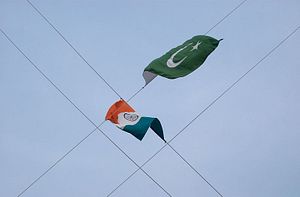Indian Prime Minister Narendra Modi surprised the world when he invited the leaders of South Asian nations, including Pakistan’s Prime Minister Nawaz Sharif, to his swearing-in ceremony in May this year. His move was hailed by many in the region as a step toward engaging Pakistan, with the hope that talks between the two countries would become increasingly fruitful.
However, the Indian government on Monday evening canceled talks scheduled to be held in Islamabad on August 25 between the Pakistani and Indian foreign secretaries. The talks were called off after the Pakistani High Commissioner in Delhi, Abdul Basit, met with Kashmiri separatist leader Shabbir Shah despite the Indian government having made it clear that this would not be acceptable. This has called into question the Indian government’s commitment to improving relations with Pakistan.
The bilateral discussions were supposed to have been a follow-up to the meeting between Modi and Sharif and were supposed to set up the parameters of future engagement between the two South Asian neighbors. Additionally, the talks would have created the groundwork for a meeting between Modi and Sharif in New York next month, where both leaders may meet during the annual session of the United Nations General Assembly.
However, many in India are wondering if this is a grave enough provocation to hold the peace process between India and Pakistan ransom. This is not the first time Pakistan has held talks with fringe separatist elements based in Kashmir. For the most part, these groups are marginal groups in Kashmiri politics, but are cultivated by Pakistan for political purposes. For example, in 1999, then Pakistani President Pervez Musharraf met Kashmiri separatists, possibly for domestic political reasons. India’s prime minister at the time, Atal Bihari Vajpayee, did not take offense. Many other similar meetings have taken place since then but India never strenuously objected, as it perceived that such meetings were meant to satisfy a hardline domestic constituency in Pakistan.
India should have ignored Abdul Basit’s meeting with Kashmiri separatists this time, too. By taking a tough stand this time around, India’s government has raised the bar for talks and will make further dialogue more complicated. It will be more difficult for India’s government to lower the bar again if it wishes to engage Pakistan in future talks.
The lack of talks could also potentially hurt Nawaz Sharif, who is keen on improving relations with India. If Sharif is not seen as making progress with India, elements of Pakistan that are against rapprochement with India – such as Islamic extremists and the military – could be emboldened. As Sharif’s government is weathering enormous domestic turmoil, it would not be in India’s interests to weaken Sharif’s position.
However, there are reasons for the Indian government’s decision, many of which are related to domestic politics. The Indian government’s decision satisfies some hardline Hindu organizations, many of which form the base of support for the ruling Bhartiya Janata Party (BJP). Some Hindu organizations held demonstrations outside the Pakistani embassy in New Delhi on Monday to protest against Pakistan’s meeting with Kashmiri separatist leaders. Additionally, the government’s decision may help it consolidate the BJP’s vote in Jammu and Kashmir, which heads to the polls later this year.
Ultimately, these developments are a setback for talks between India and Pakistan. The government ought to demonstrate to the public that small irritants cannot be allowed to halt the development of better relations between India and its neighbors in the long-run. India should not give weight to irrelevant slights. Rather, India’s government should look at the big picture and the long-term benefits of improving relations with Pakistan (or China for that matter) in order to pursue its overall economic and diplomatic objectives.
































